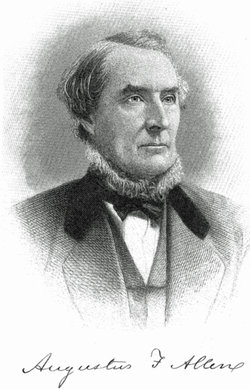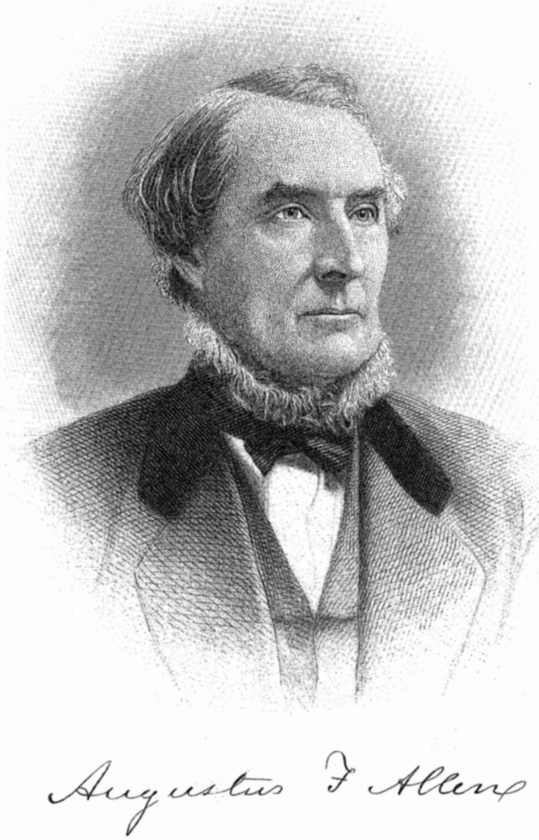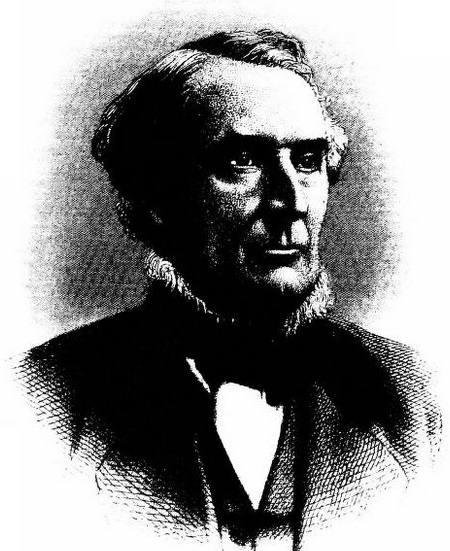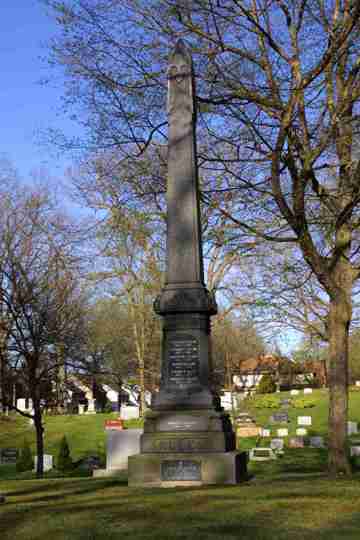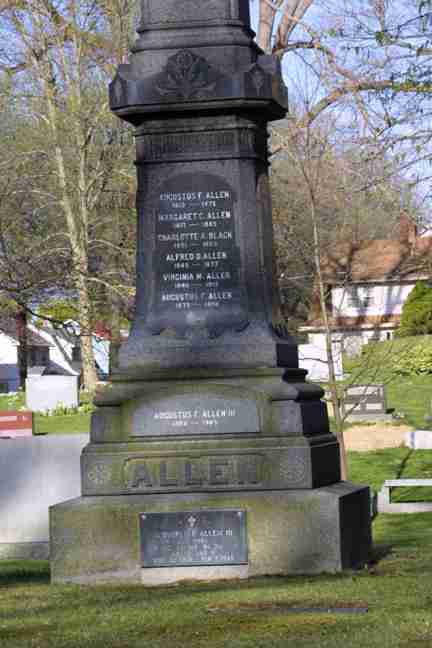He was elected to the United States House of Representatives in 1874, but died before he was able to take office.
WIFE: Margaret C. Unknown
-------------------------
(Biography published in 1875, History of Chautauqua County, New York, From Its First Settlement to the Present Time by Andrew Young, Buffalo, NY)
AUGUSTUS F. ALLEN, eldest son of Elisha and Juliet [Holbrook] Allen, was born in Wardsboro, VT, Sept. 13, 1813. His grandfather, Capt. Allen, of Princeton, Mass., while a deputy sheriff, was murdered by a man named Frost, whom he had in charge, and who had murdered his own father. Elisha Allen, father of Col. A. F. Allen, was born in Princeton, Mass., Sept. 5, 1786. He removed with the rest of the family to Vermont, and was married to Juliet Holbrook, who was born at Sturbridge, Mass., June 6, 1790. In 1816, he came to Jamestown, and bought the property on the corner of Main and Third streets, where the Gifford House now stands; returned to Vermont, and in 1826 came to Jamestown with his wife and two sons, Augustus and Dascum, the latter having been born at Wardsboro, Sept. 5, 1815. Elisha Allen also bought a farm on what is now Warren street. He afterwards occupied, as a dwelling, a part of the house previously kept as a hotel on the present site of the Jamestown House, where he died, Sept. 30, 1830, aged 44 years. His hotel property, occupied for many years by a number of keepers, remained in possession of his heirs; and after the great fire of 1852, by which it was destroyed, the sons, Augustus and Dascum, erected in its place a new building, of brick, since known as the "Allen House," now the "Gifford House." Augustus, after the death of his father, was left, at the age of 17, as the head of the family. He attended school for a time at the academies of Fredonia and Jamestown, and acquired a fair English education; and Dascum engaged as a clerk in the store of Nathaniel A. Lowry. About 1835, the brothers, the younger not yet of age, engaged in the mercantile and lumbering business, which they carried on extensively, and successfully. Abner H., the youngest brother, when of age, became a partner; and after his death, in 1849, Dascum took the concern, and afterwards, Allen & Maurice. The business of A. F. & D. Allen extended over the southern part of this county, and far into Cattaraugus Co., N. Y., and Warren Co., Pa. In 1846, they dissolved partnership, and divided their property. In 1848, Augustus became a partner of Daniel Grandin in the woolen manufacture; the latter had acquired a knowledge from the late Daniel Hazeltine, and from a Mr. Washburn in the old stone factory in First street. In 1867, the firm of Allen, Preston & Co. was formed, of which Mr. Allen was a member at the time of his death. Col. Allen also became actively engaged in public improvements. To no single individual are the people of southern Chautauqua more indebted for railroad facilities than to him. To the promotion of the various industrial interests of Jamestown, he contributed largely by his counsels, his personal influence, and his wealth. In early his life he was commissioned as colonel of a regiment of state militia, with his brother Dascum as lieutenant-colonel, and subsequently attained to the rank of brigadier-general. He took an active part in measures for the prosecution of the late war. *He was appointed colonel of the 112th regiment of New York state volunteers, and for the purpose of its organization, and for several months he gave his personal attention to recruiting. Knowing his business talents, the people of Ellicott elected him supervisor at such times as he would accept the office, until his death, which occurred just before the expiration of his seventeenth term. In 1867, he was elected a member of the constitutional convention of that year, and bore an honorable part in its deliberations. In the fall of that year, though a Republican, he accepted a nomination as an independent candidate for the state senate; and by a division of the republican vote, the democratic candidate was elected. In 1874, having become fully affiliated with the "liberal republicans," who were joined by the democrats in his support, he was elected a representative to Congress. His health had been failing; and he was ill able to endure the strain of a hotly contested political struggle. His active participation in this contest, and the anxiety he felt for his family, [wife, son Alfred D., and his daughter Charlotte, Mrs. Black,] who had gone to Europe, partly the account of the poor health of the son and daughter, had a serious effect upon his health, which became more and more impaired, until his friends and physicians became alarmed. His brain became affected. This increased the alarm. His family in Europe were telegraphed; and his wife and son started for home. They came too late to see him alive; but the burial was deferred until after their arrival. He had been a member of the Presbyterian church for nearly forty years. Never, perhaps, has the death of a citizen of Jamestown been more generally and deeply lamented.
-------------------------
He was elected to the United States House of Representatives in 1874, but died before he was able to take office.
WIFE: Margaret C. Unknown
-------------------------
(Biography published in 1875, History of Chautauqua County, New York, From Its First Settlement to the Present Time by Andrew Young, Buffalo, NY)
AUGUSTUS F. ALLEN, eldest son of Elisha and Juliet [Holbrook] Allen, was born in Wardsboro, VT, Sept. 13, 1813. His grandfather, Capt. Allen, of Princeton, Mass., while a deputy sheriff, was murdered by a man named Frost, whom he had in charge, and who had murdered his own father. Elisha Allen, father of Col. A. F. Allen, was born in Princeton, Mass., Sept. 5, 1786. He removed with the rest of the family to Vermont, and was married to Juliet Holbrook, who was born at Sturbridge, Mass., June 6, 1790. In 1816, he came to Jamestown, and bought the property on the corner of Main and Third streets, where the Gifford House now stands; returned to Vermont, and in 1826 came to Jamestown with his wife and two sons, Augustus and Dascum, the latter having been born at Wardsboro, Sept. 5, 1815. Elisha Allen also bought a farm on what is now Warren street. He afterwards occupied, as a dwelling, a part of the house previously kept as a hotel on the present site of the Jamestown House, where he died, Sept. 30, 1830, aged 44 years. His hotel property, occupied for many years by a number of keepers, remained in possession of his heirs; and after the great fire of 1852, by which it was destroyed, the sons, Augustus and Dascum, erected in its place a new building, of brick, since known as the "Allen House," now the "Gifford House." Augustus, after the death of his father, was left, at the age of 17, as the head of the family. He attended school for a time at the academies of Fredonia and Jamestown, and acquired a fair English education; and Dascum engaged as a clerk in the store of Nathaniel A. Lowry. About 1835, the brothers, the younger not yet of age, engaged in the mercantile and lumbering business, which they carried on extensively, and successfully. Abner H., the youngest brother, when of age, became a partner; and after his death, in 1849, Dascum took the concern, and afterwards, Allen & Maurice. The business of A. F. & D. Allen extended over the southern part of this county, and far into Cattaraugus Co., N. Y., and Warren Co., Pa. In 1846, they dissolved partnership, and divided their property. In 1848, Augustus became a partner of Daniel Grandin in the woolen manufacture; the latter had acquired a knowledge from the late Daniel Hazeltine, and from a Mr. Washburn in the old stone factory in First street. In 1867, the firm of Allen, Preston & Co. was formed, of which Mr. Allen was a member at the time of his death. Col. Allen also became actively engaged in public improvements. To no single individual are the people of southern Chautauqua more indebted for railroad facilities than to him. To the promotion of the various industrial interests of Jamestown, he contributed largely by his counsels, his personal influence, and his wealth. In early his life he was commissioned as colonel of a regiment of state militia, with his brother Dascum as lieutenant-colonel, and subsequently attained to the rank of brigadier-general. He took an active part in measures for the prosecution of the late war. *He was appointed colonel of the 112th regiment of New York state volunteers, and for the purpose of its organization, and for several months he gave his personal attention to recruiting. Knowing his business talents, the people of Ellicott elected him supervisor at such times as he would accept the office, until his death, which occurred just before the expiration of his seventeenth term. In 1867, he was elected a member of the constitutional convention of that year, and bore an honorable part in its deliberations. In the fall of that year, though a Republican, he accepted a nomination as an independent candidate for the state senate; and by a division of the republican vote, the democratic candidate was elected. In 1874, having become fully affiliated with the "liberal republicans," who were joined by the democrats in his support, he was elected a representative to Congress. His health had been failing; and he was ill able to endure the strain of a hotly contested political struggle. His active participation in this contest, and the anxiety he felt for his family, [wife, son Alfred D., and his daughter Charlotte, Mrs. Black,] who had gone to Europe, partly the account of the poor health of the son and daughter, had a serious effect upon his health, which became more and more impaired, until his friends and physicians became alarmed. His brain became affected. This increased the alarm. His family in Europe were telegraphed; and his wife and son started for home. They came too late to see him alive; but the burial was deferred until after their arrival. He had been a member of the Presbyterian church for nearly forty years. Never, perhaps, has the death of a citizen of Jamestown been more generally and deeply lamented.
-------------------------
Family Members
Advertisement
Records on Ancestry
Advertisement
